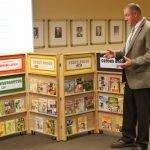Carbon School District Press Release
Remember the old advertisement that used to play on television that said “Reading is fundamental”?
Well, that hasn’t changed over the years. What has changed is the way that reading is taught in schools.
As far as Carbon School District Superintendent Lance Hatch is concerned, reading is the primary skill that students need to be proficient at. That’s because everything else they do in school is based on reading, with achievement in those other subjects dependent on mastering that skill.
Hatch said that over the years, things have often gone wrong when teaching reading. At one time, the idea was that if enough people around a child would read, they would be driven to be good readers. The trend later went in the opposite direction where the mechanics of reading became the most important thing. And, even up through fifth grade, students did not read books because they were busy doing drills and worksheets. As Hatch puts it, the pendulum just kept swinging from side to side with no proven evidence that any of it worked very well.
Like most things, when it came right down to it, the middle ground is what has proven to be the best antidote for poor reading habits, fluency and comprehension. That middle ground is getting kids to read by supplying them with as much reading material as they can consume at their present independent reading level and then letting them grow from there. And the days of forcing kids to read beyond their capabilities, and thinking that is how they will progress, is over.
“We now have a consistent process of analyzing what the most important thing is to work on in school,” said Hatch. “So, after looking at the data last year in collaboration with the district’s elementary principals, it was very clear that we had an issue. I asked a simple question. ‘What level is this student reading at and what level is that student reading at?’ Honestly, we had no idea. Last year at this time, we didn’t know what one student in the districts reading level was. So, we couldn’t answer any questions beyond that. Questions like how far are they from where they should be in terms of their reading level. We couldn’t answer what it might take to get them there either. ”
Consequently the first step last year was to assess all students and find each one’s reading level. Then, the educators could analyze the data properly.
“When I came here, there were many school improvement plan goals that stated, ‘We want every child to make a year’s worth of growth within a year,'” he explained. “When we examined the data and looked at where student levels should be, a year’s worth of growth was not going to be enough. Many students needed accelerated growth far beyond typical growth if they were going to catch up to where they should be.”
So, after asking the tough questions, the district decided to make changes. Hatch said it could not have been done without the amazing group of administrators that are in the district, which he called “the best group of principals I have ever worked with.”
“They are honest, they are reflective and they are not afraid of tackling the tough issues,” he stated. “We are all about looking in the mirror, with warts and all, and examining what we are doing.”
Hatch said he has been asking those tough questions his whole career and working to find the answers to them.
“And I just happened to have the right experiences to be able to contribute to the solution to the reading problem the district had,” he said.
He explained when he was principal at Ashley Elementary in Uintah School District, they had the same situation he found when he came to Carbon District last year. School personnel did not know the reading levels of any of the students in the school. So, the school team took a year and collected data. After that, they were able to ascertain that only a few students had really improved, and they had not improved that much over the year. Many didn’t improve at all. There were only a few that had improved a great deal.
“That made us ask ourselves if what we were doing was working and the answer was absolutely not,” he stated. “So, everything we did from that point on was to learn how to make accelerated growth.”
At that point in time, Hatch happened to be in his doctoral program and he had access to a great deal of research. He said after studying, he came across the same name over and over again.
That name was Richard Allington.
“His research on this is very clear and everyone quotes him, but no one does what he says should be done,” said Hatch. “So, we implemented those principles of enormous quantities of text at the right level (an independent level that is not too hard and not too easy) and a lot of time spent reading. The teachers had to carve out time in the day for the kids to do it and that wasn’t easy. They had to sacrifice some of the things that were good that they did, but that were not as important. ”
The result, Hatch said, was amazing. Where the school had been ranked in the state (13th in schools of their size and demographics) in reading when they measured data the first time, they had soared to the top of the list after only one year. That top proficiency was leaps and bounds above the state average. That is now the goal of the reading program in Carbon School District.
“The thing that was really cool about all that was that while we focused on reading and not other subjects, the math scores actually went up too,” he related. “Math is really tied to reading and so the improvement showed there as well. So, we know it works, but where it all falls apart when many people try it is in the application. That’s that hard part.”
He said that with the way things go with legislative mandates and other things added to the plates of teachers every year, doing this is difficult. He said that one of the reasons he wanted to be a superintendent was so he would be able to say “The buck stops here. I want you to stop doing some of these good things you do as teachers, to make room to do the best things” and that is getting kids to read at the level they should be reading in the grade they attend.
“That concept is so foreign in education,” he said. “We have learned to be the jack of all trades and the master of none. We needed to turn that concept on its head to get this done. So, it is a kind of a scary time for our teachers because they have to change how they approach instruction.”
Hatch said that the heart of the matter is that practice makes perfect, but that wasn’t how it was done in the past.
“Historically, we were always pushing kids to that next level,” he said. “So, they never got to read at the level they were successful at. For many, it made them miserable and consequently, they hated reading. We need students to get the right kind of practice, the perfect practice. And with a lot of that eventually they will be able to continue to grow. We need to take the time to let them grow. What we are going to see with what we are doing now is that they will quickly accelerate to the next level from the one where they are and it isn’t because we are forcing them, but because they are getting so good at it they are ready for the next level. It’s a natural progression.”
Hatch said he believes the rising tide lifts all boats when it comes to all subjects in schools and there is only one rising tide in the curriculum that impacts all other areas of the curriculum and that is reading. All subjects improve when students read better.
“It lifts everything that rides on it. It lifts a student’s ability to learn science, social studies, health, arts and all other boats that are sitting on that tide. Reading is the only thing that raises every boat,” he concluded.




